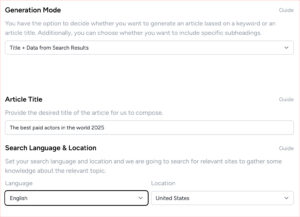In the realm of contemporary business communication, crafting compelling client stories has emerged as a pivotal strategy for establishing brand credibility and fostering customer engagement.
ChatGPT, an advanced language model developed by OpenAI, offers a revolutionary tool for businesses seeking to enhance their narrative techniques.
This article explores the multifaceted applications of ChatGPT in creating effective client stories, emphasizing its ability to generate coherent, engaging, and personalized content.
By leveraging the capabilities of artificial intelligence, companies can streamline the content creation process, ensuring consistency and creativity across various platforms.
Furthermore, the integration of ChatGPT into marketing and customer relations strategies can significantly amplify the impact of case studies, testimonials, and success stories.
This examination delves into the practical benefits and potential limitations of utilizing ChatGPT, providing insights into how businesses can harness this technology to elevate their storytelling and ultimately drive client engagement and satisfaction.
Understanding Client Needs
Understanding client needs is essential for tailoring solutions that effectively address their specific challenges.
The modern business landscape demands a revolutionary approach to personalization and engagement. Identifying and comprehending client needs enables the creation of bespoke solutions that foster deeper connections and drive meaningful results.
Precision in understanding client needs is the cornerstone for achieving high levels of personalization.
This involves meticulous data collection and analysis to uncover insights that inform tailored strategies. Personalization is not merely a trend but a necessity in the quest to resonate with clients on a granular level. Tailored solutions demonstrate a commitment to addressing unique challenges, thereby enhancing client satisfaction and loyalty.
Moreover, engagement plays a critical role in this process.
Effective engagement strategies ensure continuous dialogue and feedback, fostering an environment where clients feel valued and understood. By prioritizing client needs, businesses can revolutionize their approach, ensuring that every interaction is purposeful and impactful.
This strategic focus on understanding client needs ultimately paves the way for transformative client relationships.
Leveraging ChatGPT for Insights
Harnessing the power of ChatGPT can unlock valuable insights that drive informed decision-making and innovation.
By analyzing vast amounts of data, ChatGPT can identify emerging trends and patterns in client behavior, offering a deeper understanding of client needs. These insights enable organizations to tailor their strategies and solutions, ensuring alignment with evolving market demands.
Personalization emerges as a critical outcome of leveraging ChatGPT for insights.
By understanding individual client preferences and behavior, businesses can craft unique and relevant experiences that resonate with their audience. This level of personalization fosters stronger client engagement, as clients feel understood and valued.
Furthermore, ChatGPT’s analytical capabilities extend beyond mere data collection.
It synthesizes information into actionable insights, empowering organizations to make data-driven decisions swiftly. In an era where client expectations are continually shifting, the ability to adapt and respond promptly is paramount.
ChatGPT’s insights thus serve as a catalyst for dynamic and responsive client engagement strategies, driving sustained growth and competitive advantage.
Personalizing Storytelling Approach
Adopting a personalized storytelling approach can significantly enhance the way organizations connect with their clients.
By tailoring narratives to align with specific client needs, businesses can foster deeper engagement and create more meaningful interactions. Personalization in storytelling ensures that each client feels uniquely valued and understood, which can lead to stronger client relationships and increased loyalty.
Understanding client needs is pivotal in this approach.
Detailed client profiles, which include preferences and pain points, enable the creation of stories that resonate on a personal level. This targeted approach not only captures attention but also sustains it by addressing individual concerns and aspirations.
Furthermore, personalized storytelling leverages data-driven insights to craft messages that are relevant and compelling.
Advanced tools like ChatGPT can analyze client interactions and feedback to generate customized narratives that drive engagement.
In an era where clients demand more tailored experiences, adopting a personalized storytelling approach is essential for organizations aiming to revolutionize their client engagement strategies.
Enhancing Brand Messaging
Effective brand messaging is crucial for establishing a strong and cohesive identity that resonates with target audiences.
Revolutionizing this aspect requires a profound understanding of client needs, along with a strategy that ensures personalization and engagement.
Utilizing advanced tools like ChatGPT can significantly enhance brand messaging by tailoring communications to meet specific client needs. It allows brands to create personalized content that speaks directly to the unique preferences and values of their audience.
Furthermore, ChatGPT’s ability to analyze vast amounts of data enables it to generate insights that inform the development of more nuanced and compelling messages.
This leads to higher levels of engagement, as clients feel understood and valued. The precision and consistency in messaging foster a deeper connection with the brand, encouraging loyalty and advocacy.
By harnessing these capabilities, brands can transcend traditional communication barriers and create a revolutionary impact in their market.
Thus, the integration of ChatGPT in brand messaging paves the way for a more dynamic and responsive engagement strategy.
Generating Compelling Narratives
Crafting compelling narratives is essential for capturing the audience’s attention and creating a memorable brand experience.
The integration of ChatGPT in generating these narratives revolutionizes the approach to storytelling by addressing specific client needs with precision.
By harnessing the power of artificial intelligence, businesses can achieve a higher degree of personalization, ensuring that each narrative resonates deeply with its intended audience.
ChatGPT’s ability to analyze and incorporate client needs into the narrative framework enhances the overall engagement potential.
Personalized stories not only reflect the unique aspects of each client but also foster a stronger connection with the audience, driving brand loyalty and advocacy.
This level of customization is critical in today’s competitive market, where generic content fails to leave a lasting impact.
Furthermore, the dynamic nature of ChatGPT allows for real-time adjustments and refinements to the narratives, ensuring they remain relevant and compelling.
Ultimately, the strategic use of ChatGPT in crafting narratives elevates brand storytelling, meeting client needs while maximizing engagement.
Improving Engagement Strategies
Maximizing engagement strategies with ChatGPT involves leveraging its advanced capabilities to create interactive and personalized experiences.
Analyzing Client Needs
ChatGPT can analyze client needs through sophisticated data processing, enabling the tailoring of content to specific preferences and requirements. By focusing on personalization, ChatGPT ensures that each client story resonates deeply with the target audience, thereby enhancing overall engagement.
Dynamic and Responsive Storytelling
Utilizing ChatGPT in client interactions allows for dynamic and responsive storytelling. This adaptability ensures that narratives remain relevant and compelling, addressing individual client needs in real-time. Furthermore, ChatGPT’s ability to generate varied content styles fosters a more engaging and immersive experience, keeping the audience captivated.
Benefits of ChatGPT in Client Engagement
ChatGPT stands as a pivotal resource in revolutionizing client engagement. Its capacity to:
- Synthesize complex information
- Deliver personalized narratives
Guarantees higher levels of client satisfaction and loyalty.
By prioritizing engagement through personalization, businesses can create impactful client stories that not only meet but exceed client expectations.
Crafting Emotional Connections
Building emotional connections through ChatGPT involves creating narratives that evoke empathy and resonate on a deeper, more personal level with the audience.
Crafting these connections starts by thoroughly understanding client needs. This approach ensures that the stories developed not only address these needs but also align with the broader goals and values of the clients.
Personalization is critical in this process. By tailoring stories to reflect the unique experiences and challenges faced by individual clients, ChatGPT can generate content that feels authentic and relatable.
Such tailored narratives foster a sense of genuine connection and trust, which significantly enhances engagement.
Engagement is further amplified when the content is designed to invoke strong emotional responses.
By integrating elements of:
- vulnerability
- hope
- triumph
ChatGPT can produce stories that captivate and inspire audiences.
This strategic use of emotional appeal transforms generic content into powerful, client-centric narratives that drive meaningful interactions and foster lasting relationships.
Tailoring Content for Audience
Crafting content that resonates deeply with the audience requires a nuanced understanding of their preferences, behaviors, and pain points.
Addressing client needs effectively necessitates the adoption of personalization strategies that ensure each narrative feels uniquely tailored. Personalized content not only acknowledges individual client journeys but also significantly amplifies engagement levels, fostering a more profound connection with the audience.
The importance of this approach cannot be overstated in an era where clients seek more than generic solutions.
By leveraging data analytics and artificial intelligence tools like ChatGPT, it becomes feasible to discern intricate client behaviors and preferences. This information can then be utilized to craft compelling stories that speak directly to the audience’s core concerns and aspirations.
Moreover, personalization in client stories drives engagement by making the content relatable and relevant. Engaged clients are more likely to:
- Interact
- Share
- Advocate for the brand
This creates a ripple effect that underscores the revolutionary potential of tailored content strategies.
Implementing Feedback Loops
Implementing feedback loops is crucial for continuously refining and enhancing the effectiveness of client stories.
Feedback loops ensure that the evolving client needs are met with precision, fostering a higher level of engagement.
By systematically collecting and analyzing client feedback, content can be tailored more accurately, achieving a degree of personalization that resonates deeply with the audience.
Key Components of Feedback Loops:
- Engagement metrics
- Qualitative reviews
- Direct client input
The data garnered from these sources allows for the identification of strengths and areas that require improvement within the client stories.
Consistent iteration based on this feedback fortifies the narrative, making it more compelling and aligned with client expectations.
Benefits of Dynamic Feedback Loops:
- Ensures client stories remain relevant in a rapidly changing market landscape.
- Augments the storytelling strategy.
- Solidifies the client relationship.
- Positions the organization at the forefront of innovation and client satisfaction.
Measuring Story Impact
Quantifying the impact of client stories is essential for understanding their effectiveness and guiding future content strategies.
Objective metrics such as engagement rates, conversion rates, and audience retention provide invaluable insights into how well these stories resonate with target audiences.
Meeting client needs involves tailoring stories to reflect their unique experiences and challenges, fostering a deeper connection and enhancing personalization.
Advanced analytics tools can track key performance indicators (KPIs), offering a comprehensive view of how client stories perform across various platforms.
Engagement metrics include:
- Likes
- Shares
- Comments
These metrics reveal the extent to which audiences interact with the content, indicating its relevance and appeal.
Conversion rates measure the success of stories in driving desired actions, such as:
- Inquiries
- Purchases
Utilizing data-driven insights, organizations can refine their storytelling approaches, ensuring alignment with client needs and optimizing personalization.
This continuous optimization fosters a cycle of improvement, ultimately revolutionizing the way client stories are crafted and delivered.
Future of Client Storytelling
The future of client storytelling lies in leveraging advanced technologies and data analytics to create more personalized, impactful narratives.
By utilizing artificial intelligence platforms such as ChatGPT, businesses can tailor stories that precisely address client needs.
This customization ensures that each narrative resonates deeply with the target audience, enhancing emotional engagement and fostering a stronger connection with the brand.
Moreover, data analytics plays a crucial role in identifying specific preferences and behaviors.
This insight enables the crafting of stories that not only capture attention but also maintain sustained interest, leading to higher levels of engagement.
The use of predictive analytics further allows for the anticipation of client needs, ensuring that the content remains relevant and compelling over time.
In essence, the integration of cutting-edge technology and detailed data analysis heralds a new era in client storytelling.
This approach transforms traditional methodologies, offering a dynamic, responsive, and client-centric narrative framework that meets and exceeds modern expectations.
How can ChatGPT help in managing confidential client information?
To manage confidential client information, utilizing ChatGPT can enhance security by automating data encryption and access controls.
It offers real-time monitoring for any potential breaches and ensures secure transmission of sensitive data.
Moreover, ChatGPT can streamline communication processes, allowing for efficient sharing of information within a secure environment.
Overall, integrating ChatGPT in managing confidential client information can significantly bolster data protection measures and enhance overall security protocols.
What are the potential ethical concerns when using ChatGPT for client stories?
Potential ethical concerns arise when using AI like ChatGPT for client stories, including:
- Privacy breaches due to data storage and misuse risks.
- Accuracy and bias issues leading to misinformation.
- Lack of human empathy or understanding in sensitive matters.
To mitigate these concerns and uphold ethical standards in utilizing AI for client information management, the following measures are crucial:
- Transparency
- Consent
- Secure data handling
Additional steps to address these challenges include:
- Regular audits
- Adherence to ethical guidelines
How does ChatGPT integrate with existing CRM systems?
Integration of ChatGPT with existing CRM systems can streamline customer interactions by:
- Automating responses
- Gathering data
- Providing personalized insights
APIs can facilitate seamless communication between ChatGPT and CRM platforms, enabling real-time data synchronization.
This integration enhances:
- Customer experiences
- Data accuracy
- Operational efficiency
By leveraging ChatGPT within CRM systems, organizations can:
- Enhance customer engagement
- Drive sales
- Optimize their overall business processes
Conclusion
In conclusion, ChatGPT is a powerful tool for crafting impactful client stories.
By understanding client needs, leveraging insights, and personalizing storytelling, brands can:
- Enhance messaging
- Engage audiences effectively
Key to success includes:
- Embracing emotional connections
- Tailoring content for specific audiences
Essential steps for continuous improvement are:
- Implementing feedback loops
- Measuring story impact
The future of client storytelling with ChatGPT looks promising, offering endless possibilities for creative and compelling narratives.





